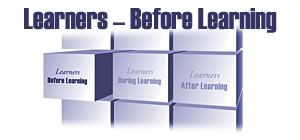|
|||||||||||||||||||||||||||||||
Participate in needs assessments and planningYou can make training more beneficial and relevant to you and your organization by proactively identifying your learning needs, participating in needs assessments and helping to plan for the training and learning activities. By yourself or together with your supervisor and co-workers, consider what new or upgraded skills you need in order to improve the quality of services at your facility. Ask your supervisor what learning activities or other types of interventions are available to address these needs. Sometimes we don't know what we need, especially in areas such as communication, leadership, supervision and management. These needs can be identified through various types of needs assessments. If your supervisor is conducting a performance needs assessment, or if trainers are on-site collecting information related to a training intervention, communicate what you think are the existing problems at your work site. Offer your suggestions for what skills and training approaches might suit your needs. You can do this by completing questionnaires, participating in discussions with co-workers, volunteering to have your performance observed and assessed, or even offering to help field-test or review new training courses. Once you have been selected for participation in a learning intervention, there are several important things you can do to prepare for transferring the new knowledge and skills you will learn back to your job. These activities are described below. Review course objectives and expectations and prepare preliminary action plansReview the course objectives and expectations and then talk with your supervisor about them. Clarify the ways in which the training objectives are related to your job and how the learning opportunity will improve your work potential, your skills and the services you provide. Discuss your expectations and those of your supervisor. Determine how you will practice and apply your new skills during and after training. Ask what support you will receive from your supervisor. Compile a list of the agreements you make with your supervisor. These may include:
This discussion with your supervisor, and a later discussion with co-workers, can help you begin your preliminary action plan by identifying your tentative goals and activities. See the sample action plan for more information. Begin establishing a support networkEven before the training starts, you can begin to prepare a support network that will help you to apply your new skills. Tell your co-workers about your upcoming training and let them know that you will share key learning points and resources with them afterwards. You may want to schedule a debriefing session to occur soon after the training course so that you can share with them your final action plan and solicit ideas for implementing what you have learned. Some learning approaches may allow you to practice new skills with co-workers while you are learning. For example, on-the-job learning, self-directed learning and group-based learning that take place over several sessions or modules often include skill practice or assignments that learners must complete between the sessions. If one or more co-workers are participating in the same training course, you can complete pre-course learning activities together, then share with each other what you hope to gain from the training and how you want to work together to apply your new skills. Talking with your co-workers will help you develop a commitment to support each other to improve your skills and the quality of health care services that you provide. Complete pre-course learning activitiesPrepare yourself to get the most out of the training by completing any required pre-course activities or learning tasks. In addition to the course description and objectives, the trainer may send you some background reading, a self-assessment questionnaire, and case examples or problems to analyze. Some courses require learners to successfully complete a self-directed learning module before they are eligible to start the course. The pre-course activities might also include gathering information or case examples from your own experience or work site to bring for use in training activities. Completing pre-course activities helps to ensure that you are prepared to learn and apply the new content in the course and also provides information that trainers need to make the course more relevant to your experience and working environment. | |||||||||||||||||||||||||||
